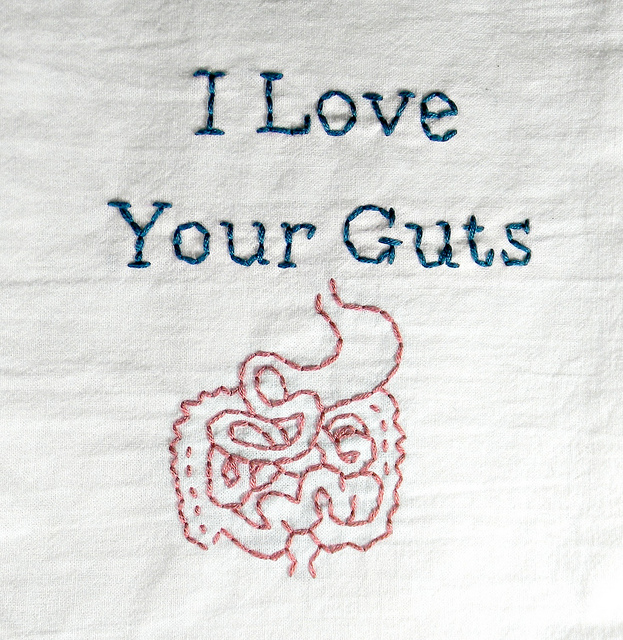I am passionate about holistic health.
Stay with me, here.
When I say that, I’m not just talking about your health and mine. That would be far too mundane. I’m talking about the health of our soils, our ecosystems, our world. Of course, these are inextricably linked in many ways. However, the thing that really gets me tingling is something smaller than the eye can see:
Microbes.
Recent studies (like this, this and this) illustrate that the microbes in our guts impact (and often determine) our overall physical and mental health. In the same way, they replenish soils and make it possible for us to grow healthy produce.
You’d think that something so integral to our global health—and by extension, our economy, world peace and food security—would be something the whole world would obsess about. Especially since remedial doses of microflora would be an astronomical aid in addressing the autoimmune and mental or brain related epidemics that have taken our world by storm.
But it seems not.
Probiotic foods and ecosystem agriculture seem to be broadly considered “fringe” fetishes. Antibiotics are still handed out willy-nilly, and the majority of pharmaceutical probiotics are over-simplified, over-priced and under-sold, considering their fundamental importance to our world and well-being.
I have been sick with a chronic illness for many years. My illness has been considered mysterious and therefore widely misunderstood, until recently.
Science has now found connections between the brain and intestinal inflammation, and their relation to microbial dystopia and digestive dysfunction. These can cause an array of neuro-immunological, hormonal and pain related ailments such as rheumatoid arthritis and the burning muscle pain known as fibromyalgia.
It turns out they may well also be responsible for mood and personality related disorders as well.
It has been found that a huge proportion of our bodies are microbial. For every human cell, we have approximately 10 microbial cells. In our guts, it’s about 10 times that—or should be, if we were in good health. Our cellular energy makers, our mitochondria, appear to be microbial in origin as well.
This absolutely blows my mind. We’re not simply humans—we’re walking, talking symbiotic ecosystems, fueled with the building blocks of billions other tiny critters. It’s a travesty they get such a bad rap when they’re the reason multi-cellular life is possible.
Our guts and our lungs are our first port of call between our inner bodies and the outside world. They are therefore fundamental sites for protection, respiration and digestion. Our guts, over and above being responsible for digestion, house approximately 70 percent of our immune system and 90 percent of our sites of production for happy-hormones, serotonin and dopamine. So it’s no wonder that things are going awry with the sorts of diets we’re eating. Understanding this, and eating accordingly, seems to have brought me back from the brink as I continue to experience increasing levels of vibrant health, peace and well-being.
I’ll touch on prebiotics, too. This is just a silly name for “the stuff that probiotics live off of.” See, the microbes in our guts feed off the food we eat. And let’s be honest—sometimes, what we put down our throats isn’t really food. It’s highly processed, completely devoid of real minerals, vitamins and other nutrients. Often, it’s been treated with everything from glyphosates and other herbicides, to a host of nasty, unnecessary additives. What do you think those do to our precious microbial ecosystem? That’s right—nothing good. These things are designed to kill off microbes.
We need real fruits and vegetables to give our boys a chance.
So, I like fruits and vegetables. Real ones, in their real state. In fact, I rarely eat anything else. I like my gluten-free pancakes and some dark chocolate from time to time, but those are a treat. The rest of the time, I’m crazy about foods that send my microbes into a living frenzy, because I want that vibrancy and energy to reflect in me.
Prebiotic foods are my staple, but probiotic foods are important, too. Yes, you know the stuff: fermented foods of all sorts, probiotic drinks and supplements. Left, right and center if I can help it—with wisdom and balance, of course.
Realizing how much these little critters help me thrive, I understand the importance of taking great care in how my food is produced. I’d love my food to come from mineral rich soils, full of microbes. This helps my body absorb an optimal amount of nutrients.
It blows my mind that people aren’t taking this into consideration en masse. Resuscitating the life of our soils and digestive systems should be a wide scale operation.
Those massive, brightly coloured vegetables we see at farmers’ markets and community vegetable growing competitions grow that way because they’re given the nutrients and microbial support that they were genetically programmed for—it’s a system of ecological symbiosis.
Just like us.
Something else caught my eye recently: This rising violence and discontent.
I know from my own experience that foods can cause negative reactions in our bodies. If we eat something that our body reacts against, it can impact our mood in the same way that cocaine and other drug-like substances do. We can become depressive, aggressive, melancholy or generally just blegh from the food we eat. Without being aware of this physiological root, we may be fighting a losing battle with the various social issues that plague our world. By addressing the underpinning biological roots, we may have a greater chance of success.
With so much adrenaline coursing through our veins from eating rubbish that ruins our microflora, we’re literally bathing ourselves in stress. Such stress may be a ticking time bomb that brings this world into chaos.
I notice that when I eat well, I am peaceful. I don’t get upset easily, I find it easier to be present and grounded, and I am able to listen and observe without reacting emotionally. I think the world could do with more people like this.
If I find myself flying off the handle and absolutely losing my sh*t after eating something my body reacts to, then it’s highly likely that others do too. Whether it be in an autoimmune disease, issues of depression or anxiety, or feelings of aggression and loss of self-control.
I believe that by prioritizing the understanding and resuscitating of our microbial world, we could be our own saving grace—on so many levels.
Relephant:
How to Fight Inflammation & Support your Microbiome for Overall Wellness.
Author: Catherine Simmons
Image: Flickr
Apprentice Editor: Brianna Miller / Editor: Emily Bartran
~











Read 22 comments and reply